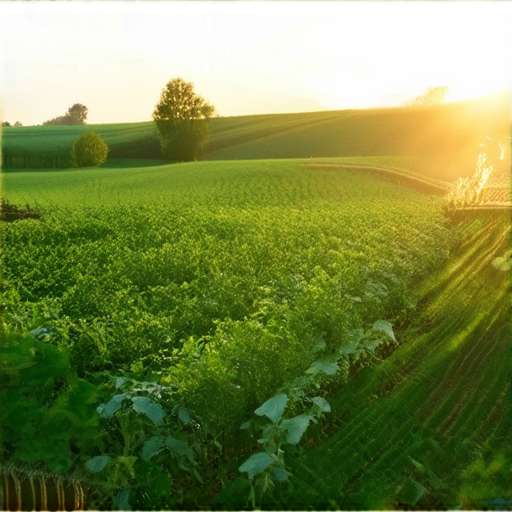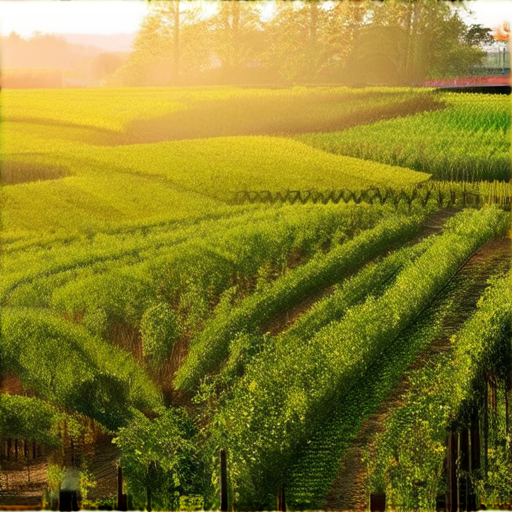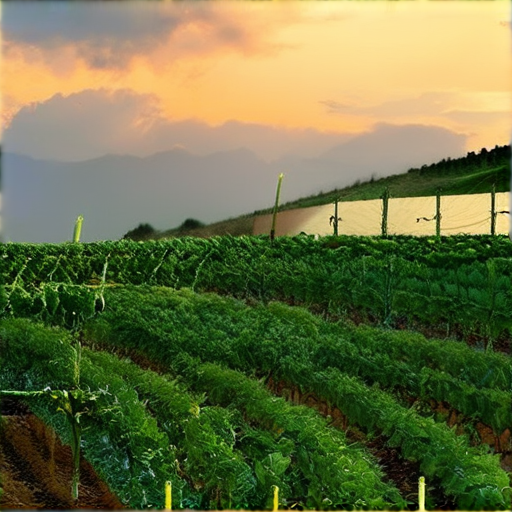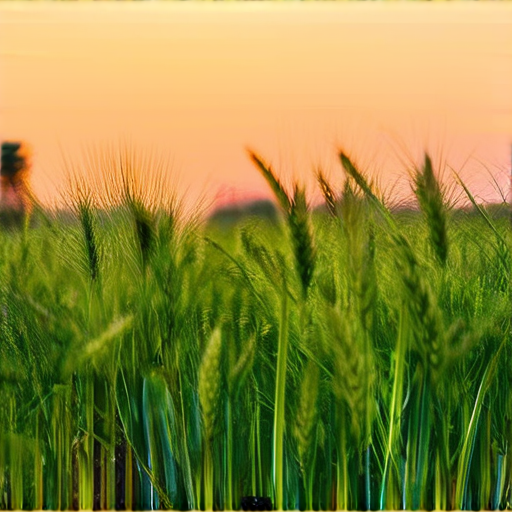Sustainable crop production has become a pressing concern for farmers, policymakers, and consumers alike, as the world grapples with the challenges of climate change, soil degradation, and water scarcity. At its core, sustainable agriculture refers to farming practices that prioritize environmental stewardship, social equity, and economic viability, ensuring that crops are grown in ways that promote long-term productivity and minimize harm to ecosystems.
What is Sustainable Agriculture?
Sustainable agriculture refers to farming practices that prioritize environmental stewardship, social responsibility, and economic viability.
- Farming Practices:
- Reducing synthetic fertilizers and pesticides
- Implementing crop rotation and cover cropping
- Conserving water and soil health
- Protecting biodiversity and ecosystems
- Environmental Benefits:
- Soil conservation and improved fertility
- Water conservation and efficient use
- Biodiversity conservation and ecosystem services
- Climate change mitigation through reduced greenhouse gas emissions
- Social Benefits:
- Improved livelihoods for farmers and rural communities
- Increased access to healthy and nutritious food
- Support for local economies and job creation
- Empowerment of women and marginalized groups
- Economic Benefits:
- Increased crop yields and productivity
- Improved market access and prices
- Reduced costs through efficient use of resources
- Increased resilience to climate change and market fluctuations
- Agroecology: Emphasizing ecological principles and practices to promote soil health, biodiversity, and ecosystem services
- Organic Farming: Avoiding synthetic fertilizers and pesticides, and relying on natural processes to control pests and diseases
- Regenerative Agriculture: Focusing on regenerating soil health, biodiversity, and ecosystem services through practices like no-till or reduced-till farming
- Integrated Pest Management (IPM): Using a holistic approach to manage pests and diseases, combining physical, cultural, biological, and chemical controls
- Food Security: Ensuring access to healthy and nutritious food for present and future generations
- Environmental Conservation: Protecting biodiversity, conserving water and soil, and mitigating climate change
- Social Justice: Empowering farmers, rural communities, and marginalized groups through fair trade practices and equitable distribution of benefits
- Economic Viability: Increasing crop yields, improving market access, and reducing costs through efficient use of resources
-
Soil Conservation
Soil conservation is crucial in sustainable crop production. This can be achieved through techniques such as crop rotation, cover cropping, and reduced tillage.
- Crop rotation helps to break disease and pest cycles, reducing the need for pesticides and fertilizers.
- Cover cropping prevents soil erosion and adds organic matter to the soil.
- Reduced tillage minimizes soil disturbance, preserving soil health and structure.
-
Irrigation Management
Irrigation management is essential in sustainable crop production. This can be achieved through techniques such as drip irrigation and mulching.
- Drip irrigation delivers water directly to the roots of plants, minimizing evaporation and runoff.
- Mulching retains moisture in the soil, reducing the need for frequent watering.
-
Pest and Disease Management
Pest and disease management is critical in sustainable crop production. This can be achieved through techniques such as integrated pest management (IPM) and biological control.
- IPM involves using a combination of techniques to manage pests, including cultural controls, physical controls, and chemical controls.
- Biological control uses living organisms to control pests, such as beneficial insects and microorganisms.
-
Organic Amendments
Organic amendments are essential in sustainable crop production. These can include compost, manure, and green manure.
- Compost adds nutrients and improves soil structure.
- Manure provides nutrients and improves soil fertility.
- Green manure adds organic matter and improves soil health.
-
Integrated Farming Systems
Integrated farming systems involve combining multiple crops and livestock on the same farm.
- This approach promotes biodiversity and reduces the need for external inputs.
- It also helps to sequester carbon and reduce greenhouse gas emissions.
-
Soil Conservation
Building rich, fertile soils through conservation tillage, cover cropping, and crop rotation helps retain moisture, suppress weeds, and support beneficial microorganisms.
- Implement reduced-till or no-till farming to minimize soil disturbance and preserve organic matter.
- Plant cover crops during off-seasons to protect soil from erosion and add nutrients.
- Rotate crops to break disease and pest cycles, improving soil fertility and structure.
-
Water Conservation
Conserve water by implementing efficient irrigation systems, mulching, and crop selection.
- Install drip irrigation or precision irrigation systems to deliver water directly to plant roots.
- Apply organic mulch to retain soil moisture and suppress weeds.
- Select drought-resistant crop varieties or those with deep root systems.
-
Carbon Sequestration
Store carbon in soils through regenerative agriculture practices, such as incorporating organic amendments and minimizing synthetic fertilizers.
- Add compost or manure to soils to enhance carbon sequestration and improve soil structure.
- Avoid synthetic fertilizers, which can release stored carbon and contribute to climate change.
- Integrate cover crops and green manures to add organic matter and promote soil biota.
-
Greenhouse Gas Reduction
Reduce greenhouse gas emissions by adopting low-till or no-till farming, using cover crops, and selecting climate-resilient crop varieties.
- Minimize soil disturbance through reduced-till or no-till farming to reduce nitrous oxide emissions.
- Plant cover crops to absorb carbon dioxide and reduce synthetic fertilizer use.
- Select crop varieties bred for resilience to extreme weather conditions.
-
Crop Resilience
Increase crop resilience to extreme weather events by selecting climate-resilient varieties, implementing agroforestry, and promoting biodiversity.
- Select crop varieties bred for tolerance to drought, heat, or flooding.
- Integrate trees into farming systems to provide shade, improve soil health, and support pollinators.
- Promote biodiversity by planting diverse crop rotations and preserving natural habitats.
- Legumes: These tiny powerhouses are packed with nutrients and can thrive in poor soil conditions, making them an excellent choice for sustainable farming.
- Millet: A drought-resistant grain, millet requires minimal water and pesticides, reducing its environmental footprint.
- Sorghum: Another drought-tolerant crop, sorghum is perfect for areas with limited water resources.
- Quinoa: This protein-rich crop is highly adaptable and can grow in challenging environments.
- Amaranth: A nutrient-dense crop, amaranth is easy to grow and requires minimal maintenance.
Sustainable agriculture is essential for ensuring global food security, protecting the environment, and promoting social justice.
Key Principles of Sustainable Agriculture:
Benefits of Sustainable Agriculture:
Approach to Sustainable Crop Production
Sustainable crop production involves adopting practices that minimize harm to the environment while maximizing yields.
By adopting these practices, farmers can produce high-quality crops while minimizing their environmental impact.
Sustainable Crops
Farming for a sustainable future requires adopting conservation practices that promote soil health, conserve water, store carbon, reduce greenhouse gas emissions, and increase crop resilience to extreme weather events.
By adopting these sustainable practices, farmers can grow robust crops while protecting the environment, conserving resources, and building resilient agricultural systems.
The Most Sustainable Crop
When it comes to sustainability, crops play a crucial role in our ecosystem.
Why Choose Sustainable Crops?
Sustainable crops offer numerous benefits, including reduced water consumption, lower pesticide usage, and increased biodiversity.
- Soil Conservation: Sustainable crops help preserve soil health, preventing erosion and promoting healthy ecosystems.
- Biodiversity: By planting diverse crops, we promote ecological balance and support local wildlife.
- Climate Change Mitigation: Sustainable crops can help reduce greenhouse gas emissions and mitigate the effects of climate change.
Heirloom Gardening Tips
To incorporate sustainable crops into your garden, consider the following tips:
- Choose Heirloom Varieties: Select heirloom seeds that are resistant to pests and diseases, reducing the need for pesticides.
- Implement Crop Rotation: Rotate your crops seasonally to maintain soil fertility and prevent pests and diseases.
- Use Natural Fertilizers: Opt for natural fertilizers like compost and manure to promote soil health.
By adopting sustainable farming practices and choosing the right crops, we can create a healthier environment for ourselves and future generations.
Three Biggest Challenges to Sustainable Farming
The dominance of conventional agriculture, price fluctuations, and inadequate market infrastructure can hinder the growth of sustainable farming practices.
-
1. Dominance of Conventional Agriculture
-
2. Price Fluctuations
-
3. Inadequate Market Infrastructure
Sustainable farming often faces competition from large-scale industrial farms that prioritize high yields and low costs over environmental sustainability and social responsibility. This can lead to a lack of market demand for sustainably grown products, making it difficult for small-scale farmers to compete.
Market prices for crops and livestock can fluctuate significantly due to factors such as weather events, global supply and demand, and economic policies. This volatility can make it challenging for sustainable farmers to predict revenue and plan for the long-term, leading to financial instability and reduced investment in sustainable practices.
Sustainable farming requires access to markets that value and reward environmentally friendly and socially responsible practices. However, many rural communities lack adequate market infrastructure, including storage facilities, transportation networks, and processing equipment, making it difficult for farmers to get their products to consumers.
As a result, sustainable farmers may struggle to access fair prices for their products, invest in soil conservation and biodiversity, and maintain healthy ecosystems. To overcome these challenges, we need to support policies and initiatives that promote sustainable agriculture, increase market access for small-scale farmers, and provide education and training on sustainable farming practices.
We recommend exploring alternative market channels, such as community-supported agriculture programs, farm-to-table restaurants, and online platforms that connect consumers directly with local farmers. By working together, we can create a more equitable and sustainable food system that benefits both people and the planet.
For more information on sustainable farming practices and how to get involved, visit our Sustainable Farming Practices page or check out our Heirloom Seeds selection.
Additionally, you can learn more about the importance of sustainable agriculture and its impact on the environment by visiting the USDA Sustainability website.
By supporting sustainable farming practices and promoting a culture of environmental stewardship, we can work towards a brighter future for our planet and its inhabitants.
The Most Produced Crop in the World
Rice is the most widely grown and consumed crop globally, accounting for approximately 20% of global food production.
- Main Crops:
- Rice
- Sugar Cane
- Maize
- Wheat
- Cotton
Grains, which include cereals and legumes, are among the most widely cultivated crops due to their adaptability to various climates.
- Top Three Most Produced Crops:
- Sugar Cane
- Rice
- Maize
Old Seed promotes heirloom gardening and sustainable agriculture through its website, focusing on eco-friendly gardening methods and preserving traditional agricultural practices.
Other notable organizations in the field of sustainable agriculture include Perennial Agriculture and Regenerative Agriculture Organization.
For those interested in learning more about sustainable gardening practices, we recommend checking out our Heirloom Seeds for Beginners Guide and exploring our Sustainable Gardening Tips section.
By adopting environmentally friendly gardening techniques and preserving traditional agricultural practices, we can work towards cultivating a greener future.





0 Comments